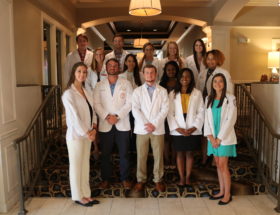As my first year of pharmacy school at Mercer comes to a close, I am reflecting on all the good and bad and have come up with a few tips for future students to brave beginning the 4 year journey to Pharm.D.
- Get involved in professional organizations. I cannot stress this enough. Go on conferences, run for leadership positions, and attend chapter events/meetings. This is number one for a reason. This is your most useful resource through pharmacy school and upon graduation. Pick one or two that represent your specific interests and invest heavily (for me it is APhA-ASP, GPhA, and NCPA, though I have also begun to get involved in PCCA and IACP). Also, learn all those acronyms as quickly as possible!
- Start your CV early. I didn’t have a CV before professional school, only a resume, but everything requires a CV now (especially applications for internships and scholarships). Ask a professor or older student for a copy of theirs so you can have a template to copy. Make sure you update it regularly and have a professor review it if possible.
- Take advantage of all the opportunities afforded to you. This includes electives your school offers (I am taking 3 in the Fall because there were so many awesome options I couldn’t choose), IPPE rotations (ask for specific placements with pharmacies that may offer a special service that you are interested in pursuing), service learning, and extra curricular activities (helping plan events, being an admissions ambassador, or joining a committee with faculty).
- Build relationships with professors early. I quickly identified the professors that previously practiced and currently focus in community pharmacy (my area of interest), and emailed them to set up meetings. I introduced myself and asked for advice on how to be the most successful in their area of specialty. They are now some of my most trusted mentors and have opened up countless doors for me, as well as have become personal friends (S/O Dr. Kinsey and Dr. Hamrick). These people will also be able to write recommendation letters for you. Applications for internships and scholarships are due before the end of the first semester, and you need to have relationships with professors who know you well enough to vouch for you at that point.
- Take a look at your social media. Is it projecting a professional image? Now that you’re in pharmacy school, you may want to take a sweep of all your accounts to be sure they portray you as you would want a future employer to see. Also, start posting things that are relevant to your profession and follow pages that will keep you educated on current issues. Click here to see details on how to do this.
- Build relationships with peers and older students. The people in your class will be by your side for at least 3 years throughout classes, and you will need their help and support. Older students can be a wonderful resource for study hints, advice, and points of connection with people in the field.
- Create a schedule. Whether this be through Google calendar, the calendar on your phone, or a real paper planner, being organized is essential to being able to handle your academic, personal, and extra curricular activities, especially if you work! I personally use a combination of my iPhone calendar and Wunderlist (a free app that allows for you to list all your to dos in a convenient list).
- Get business cards ASAP. You will need them when you attend conferences, take interviews, or meet people in your field that you want to maintain connections with. Also, get professional clothes. Similarly, you will need to make a good impression during any events you attend when you’re officially representing your school or your profession.
- Get a part-time job at a pharmacy. This is essential for experience, reinforcement of concepts (those drug cards, man!), and building a network that may lead to a job offer upon graduation. I worked at a pharmacy throughout undergrad and made the transition to intern when I began pharmacy school. Some people may recommend staying away from working to focus on academics, but I think it is more impressive if you can handle both!
- Get out of your comfort zone. I have run for elected positions, taken on leadership positions, and organized events that I never would have before pharmacy school. I have approached powerful people and introduced myself, and I have been innumerably blessed by the results.
To those future P1s out there, if you have questions or want advice from someone who just survived the same thing, don’t hesitate to reach out to me!
Please follow and like:



